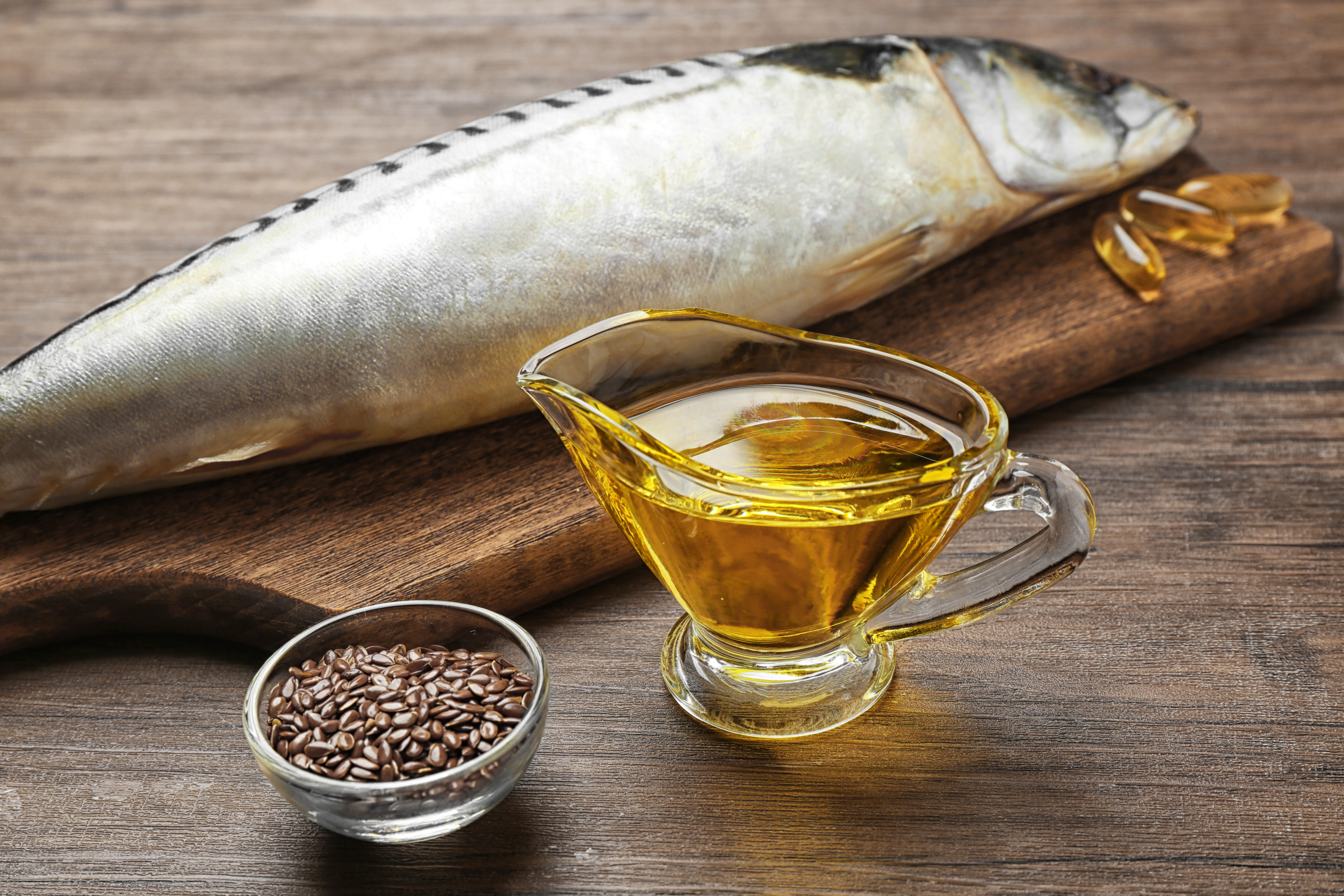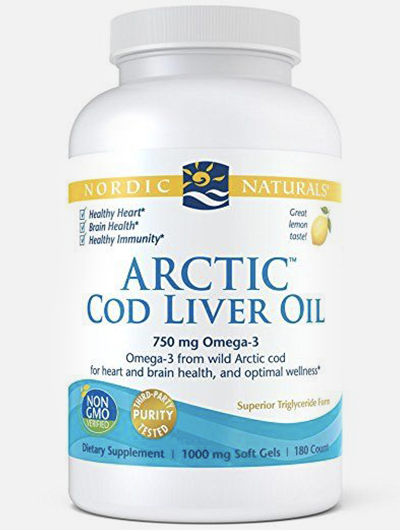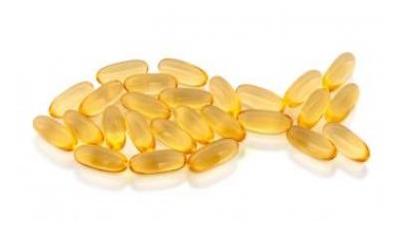Cod liver oil has been a trusted feature of the family medicine cabinet for generations. Fish oil is a popular nutritional supplement of the modern day. What makes these two things different? Isn’t cod just a type of fish? Let’s take a look at how you can use either cod liver or fish oil for your health, and how to choose between them next time you’re in the vitamin aisle.
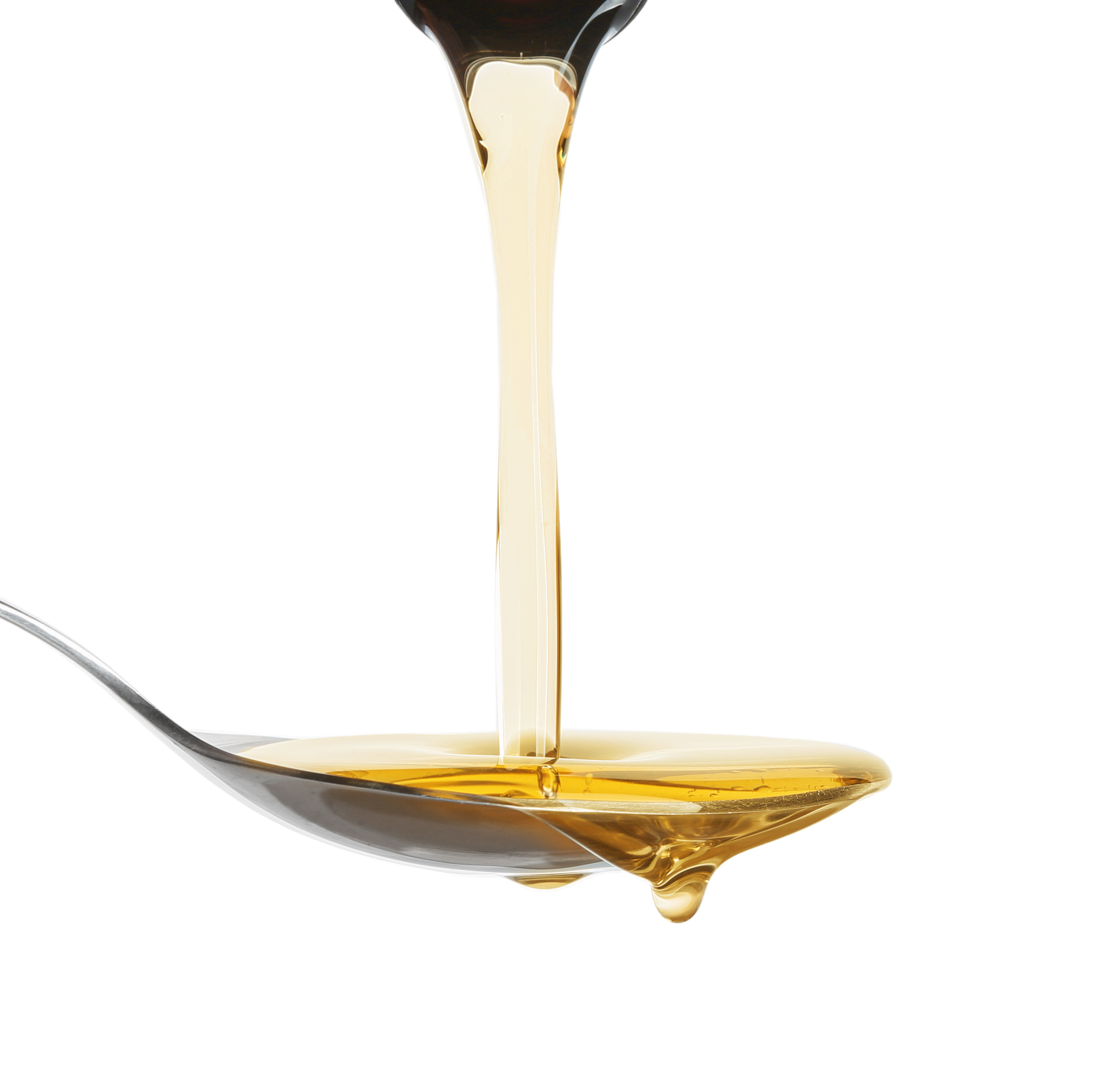

Cod liver oil comes from one part instead of the whole fish
Cod liver oil is technically one type of fish oil — oil that comes from the liver of the cod fish. However, “fish oil” typically refers to oil extracted from the entire body of the fish, not just this one organ. Fish oil supplements on the market usually contain the oils of a variety of fish species, such as sardine, anchovy, mackerel, swordfish, shark, and yes, cod.
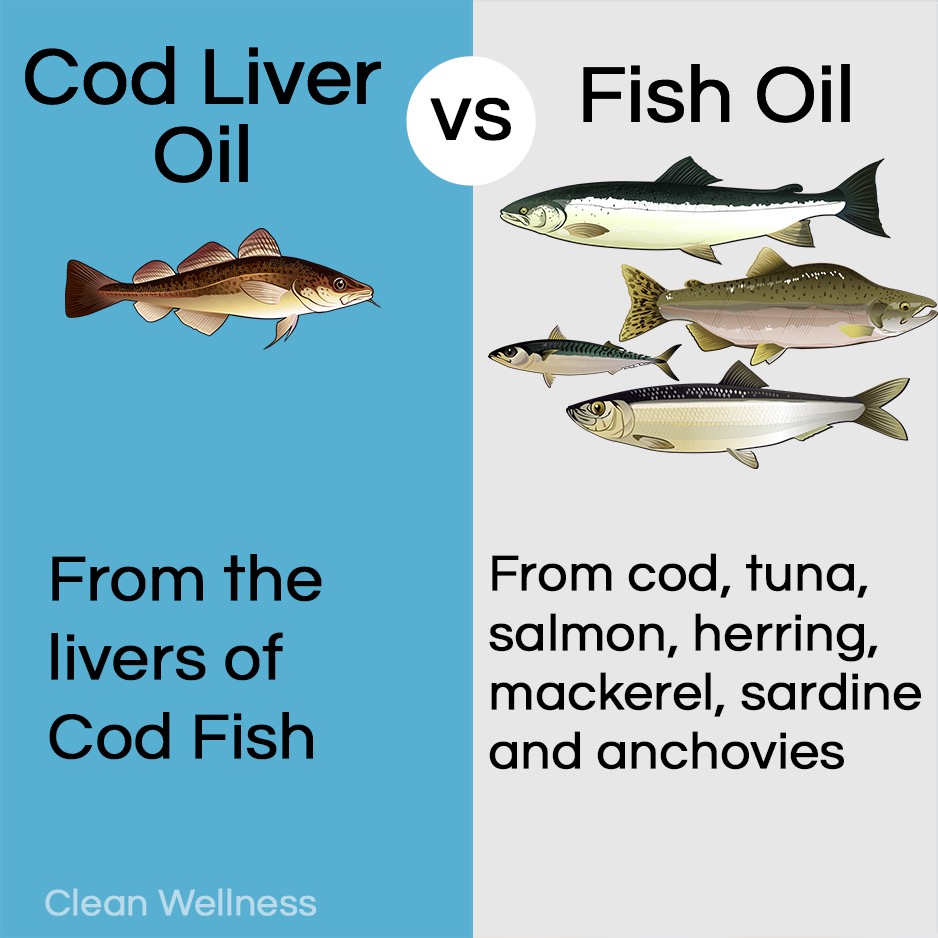

Both cod liver oil and fish oil are sources of healthy fats
Fatty fish contain large amounts of lipids and fatty acids that are important for human health. Fish oil is popular today because it is a good source of omega-3 and omega-6 fatty acids. Omega-3s are essential nutrients for heart, brain, skin, joint, and eye health.1 Both cod liver oil and fish oil are high in two particular types of omega-3 fatty acids that are difficult to obtain from plant sources: docosahexaenoic acid (DHA) and eicosapentaenoic acid (EPA).2, 3

Cod liver oil is richer in vitamins
There’s a reason why many parents used to feed their kids a spoonful of cod liver oil a day: to keep rickets away. Rickets was a common problem among growing children, was caused by a vitamin D deficiency. Taking cod liver oil, with its abundance of vitamin D, was an easy way to make sure children got enough of this vital nutrient. People at greater risk of vitamin D deficiency may wish to choose cod liver oil over other fish oils.4
Cod liver oil also contains high levels of vitamins A and E, two other important lipid nutrients. One thing to keep in mind, however, is that suppliers often add additional vitamins A and E to their products.
Check the ingredients list on the label; these vitamins might not be coming entirely from the fish. In fact, they might not even be from cod at all! Since cod liver oil has higher amounts of vitamins than fish oil, manufacturers will add vitamins to cheaper fish oils to create imitation “cod liver oil.”

Fish products should be tested for toxins
Have you heard about the problem of mercury contamination in seafood? Unfortunately, fish that come from polluted water sources tend to accumulate toxins in their bodies, particularly in their fat deposits.
Poisonous substances frequently found in fish include polychlorobiphenyls (PCBs), pesticides like dichlordiphenyltrichlorethane (DDT), and heavy metals like mercury and lead.6, 7 Look for brands that test their products for contaminants (the United States Pharmacopeia symbol is a good indicator) and have a clean report to show for it.
Summary – Cod Liver Oil Has a Higher Vitamin Content Than Fish Oil
Cod liver oil is a specific type of fish oil that is extracted from the liver of cod fish. Conversely, fish oil supplements consist of fish oils that are extracted from tissues of deep-sea fish such as tuna, sardine, trout, anchovy, mackerel, salmon, herring, swordfish, and shark, in addition to cod.
Both cod liver oil and fish oil are excellent sources of omega-3 fatty acids. These essential fatty acids support health by boosting the function of major body systems and organs including the brain, heart, lungs, and blood vessels. They are also necessary for growing babies during pregnancy. The human body does not produce omega-3 fatty acids, which means omega-3s need to be consumed daily through food or supplements.
In addition to supplying the body with essential fatty acids, cod liver oil is a rich source of vitamin D that helps target vitamin D deficiency. Cod liver oil also contains ample amounts of vitamin A.
In general, people who do not consume two to three servings of fish (not fried) per week may benefit from taking a cod liver oil or fish oil supplement.
Overall, cod liver oil and fish oil demonstrate similar properties and offer most of the same health benefits. The risks and benefits generally differ in regard to their vitamin content, their source (e.g., mackerel, trout, cod), how the fish oil is extracted, and potential exposure of the fish to toxins before the oil is extracted.
FAQ on Cod Liver Oil Vs. Fish Oil
Both cod liver oil and fish oil are generally considered as safe. However, it is still important to speak with a healthcare professional before taking these supplements. Each type of fish oil may cause minor side effects including stomach upset, and may not be safe for all consumers.
If this supplement will be given to children, it is imperative to talk to the child’s primary care physician before administering either oil.
The safety of consuming cod liver oil or fish oil for people with known shellfish or fish allergies is not clear. A healthcare provider can help determine the risks or benefits of taking these supplements.
Furthermore, people who have blood and heart conditions should be cautious when taking either cod liver oil or fish oil.
Cod liver oil should not be taken during pregnancy.
In general, cod liver oil may cause:
- Belching
- Fishy aftertaste
- Nosebleeds
- Heartburn
- Blood thinning
Fish oil may cause:
- Rash
- Nausea
- Belching
- Fishy aftertaste
- Nosebleeds
- Diarrhea (loose stool)
- Blood clotting problems
- Drug interactions
- Fish-tasting burps and indigestion
In addition, cod liver and fish oil supplements should always be stored in a cool, dark space. If the supplement starts to smell rancid, it should not be consumed.
Cod liver oil and fish oil supplements are usually marketed in liquid, capsule, and liquid gel forms. Dietary fish oil or cod liver oil supplements usually contain less mercury than fresh fish.
The recommended amount of cod liver oil or fish oil that should be taken daily is based on the servings of DHA, EPA, and vitamins in the supplement. Although a standard serving has not been established, trusted organizations such as the World Health Organization (WHO) and the U.S. Department of Health and Human Services (HHS) suggest that healthy adults take a minimum of 250–500 mg of DHA and EPA.8
Reading supplement labels and comparing the servings of DHA and EPA to the amounts found in cooked fish can also provide an indication of a healthy daily serving.
For example:
Three (3) ounces of cooked wild-caught salmon contains about 1.22 grams of DHA and 0.35 grams of EPA9
Three (3) ounces of cooked Pacific cod contains 0.10 grams of DHA and 0.04 grams of EPA9
However, when it comes to cod liver oil and fish oil supplements, taking high amounts is not always better — consuming large amounts of omega-3 fatty acids in any form may cause unwanted side effects.
Furthermore, it is best to only take either cod liver oil or fish oil, not both at the same time. Both types of fish oils offer similar benefits due to their rich omega-3 fatty acid content, but cod liver oil has higher amounts of vitamins A and D. People who want extra servings of these vitamins in addition to omega-3s should take cod liver oil.
Individuals who are not concerned about the extra vitamins can simply take fish oil. Similarly, a fish oil supplement can be taken in addition to individual vitamin A and D supplements if the health benefits from these nutrients are desired, but cod liver oil is not a preference or cannot be taken (e.g., pregnancy).
Consuming cod liver oil or fish oil with food that provides healthy fat can also improve the digestion and absorption of the omega-3 fatty acids. In addition, individuals who are taking prescription medication should never switch to a supplement without speaking with a healthcare provider who can monitor their health.
Cod Liver Oil References
[3] BC Davis and PM Kris-Etherton. 2003. "Achieving optimal essential fatty acid status in vegetarians: current knowledge and practical implications." Am J Clin Nutr. 78(3 Suppl):640s-646s.
[4] CM Ross. 2005. "Fish Oil versus Cod Liver Oil: Is Vitamin D a Reason to Go Back to the Future." The Journal of the American Board of Family Practice. 18(5):445.
[5] E Giese, S Rohn, and J Fritsche. 2019. "Chemometric tools for the authentication of cod liver oil based on nuclear magnetic resonance and infrared spectroscopy data." Analytical and bioanalytical chemistry. 411(26):6931-6942.
[6] JJB Nevado, RCR Martín-Doimeadiós, FJG Bernardo, NR Fariñas, JMG Cogolludo, and JAC Osma. 2010. "Multiresidue determination of organochlorines in fish oil by GC–MS: A new strategy in the sample preparation." Talanta. 81(3):887-893.
[7] M Smutna, K Kruzikova, P Marsalek, V Kopriva, and Z Svobodova. 2009. "Fish oil and cod liver as safe and healthy food supplements." Neuro Endocrinol Lett. 30 Suppl 1156-62. https://www.nel.edu/userfiles/articlesnew/NEL300709A27.pdf
[8] Dietary Guidelines for Americans 2010. US Department of Agriculture & US Department of Health and Human Services https://health.gov/sites/default/files/2020-01/DietaryGuidelines2010.pdf
[9] NIH Omega-3 Fatty Acids: Fact Sheet for Health Professionals https://ods.od.nih.gov/factsheets/Omega3FattyAcids-HealthProfessional/
-
Cod Liver Oil Benefits for Skin and Hair
March 8, 2022 -
Best Cod Liver Oil
By Dr. KarenMarch 8, 2022
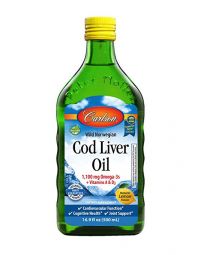
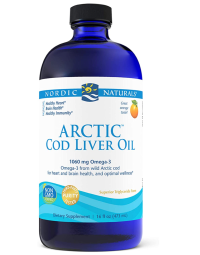
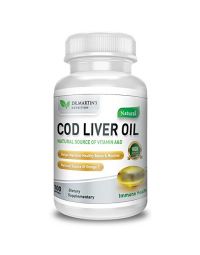
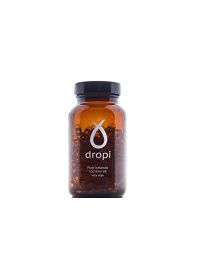
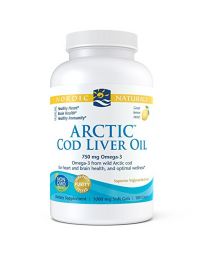
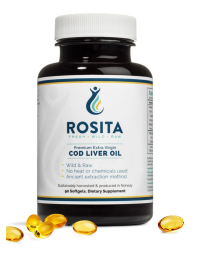
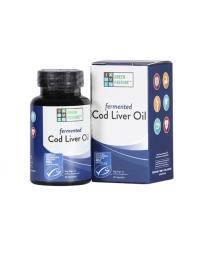
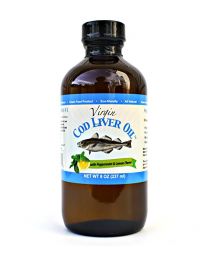
Search the blog
Article Categories
- All Articles (95)
- Rating Charts (1)
- Beauty & Skincare (17)
- FAQ (0)
- Hair Care (9)
- Health & Wellness (12)
- Anti-Aging (4)
- Kid's Health (0)
- Makeup (2)
- Men's Health (2)
- Oral Care (3)
- Sunscreen (7)
- Skin Tools & Treatments (10)
- Supplements (26)
- Videos (0)

